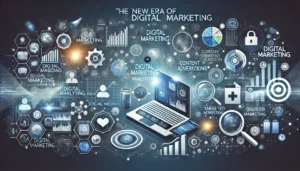Table of Contents
It would seem that nothing new can be discovered in the field of internet marketing. However, this is not the case. The trends in internet marketing over the past few years have been continuously evolving, assisting businesses with saving resources. The primary goal of any successful business in today’s market is to maximize profits by enhancing the customer experience. This involves developing and refining marketing strategies in order to effectively retain existing customers and attract new clients. In the rapidly evolving world of digital marketing, new trends emerge constantly. In this article, we will discuss what marketing trends are worth considering in the year 2024 and what marketers can prepare for. If you’re looking for an efficient tool to enhance your marketing efforts, buy virtual phone number by eSimPlus. Having a quality esim will help you to keep in touch with your team wherever you are.
Artificial intelligence
This one is obvious. Delegating routine tasks to artificial intelligence allows you to increase productivity and focus on more complex tasks, creating favorable conditions for the innovative development of various industries.
By delegating routine tasks to artificial intelligence, organizations can increase productivity and free up resources to focus on more challenging and creative work. This creates a favorable environment for the innovative growth of various industries.
Artificial intelligence (AI) is actively developing its capabilities and allowing businesses to optimize their advertising efforts, generate unique content for marketing campaigns, and create graphics. In order to automate the process of copywriting, including the selection of keywords and writing style, it is recommended that businesses utilize tools such as ChatGPT and Shopify Magic. AI is not only useful for working with text and graphics, but also for helping business owners and marketing professionals create a range of hypotheses for promoting products. This includes analyzing the target audience, creating customized product offerings for each segment, and suggesting options for promotional channels and tools.
However, AI, while it does reduce the cost of certain processes, cannot fully replace human empathy and creativity. All this emphasizes the significance of a balanced approach, whereby, for instance, a machine acts as an aid (co-pilot) and not as a substitute for human intervention.
Social media
Currently, social media platforms function not only as communication tools but also as significant digital marketing channels. According to a study by Retail Assist, 67 percent of users search for new brands on social media. Subscribers of social media represent potential customers. Therefore, companies should invest in enhancing their profiles. However, the number of these accounts is increasing annually, making it challenging to produce unique content. Numerous publications and pages from various companies are becoming increasingly similar. For instance, during the holidays, nearly all stores provide promotions and advice on selecting gifts.
In addition, when engaging with social media platforms, it is crucial to be mindful of the evolving trends in information perception. Previously, brands had minutes to convey key messages, which has since been reduced to 30 seconds and now stands at only six seconds. Should this trend continue, businesses will need to develop the ability to create highly concise content that includes all relevant information about their products.
Influence marketing
Influencer marketing continues to grow in popularity. Instead of partnering with well-known public figures, brands are increasingly partnering with micro-influencers who have a smaller and more focused audience. This allows them to create more targeted and effective marketing campaigns.
In 2023, a new type of influencer emerged on social media in Europe and the United States: ‘deinfluencers’. These influencers stand out from traditional influencers by recommending that their followers avoid certain products. They also act as experts on advertising, exposing manipulative practices, corporate double standards, and fake news. It is highly recommended to figure out the way you can benefit your company with the help of this emerging trend.
Data-driven approach
The data-driven approach to marketing is a strategy that relies on a thorough analysis of extensive amounts of information in order to identify patterns and trends in consumer behavior. This process allows marketers to make well-informed decisions when formulating their strategies and to provide a higher level of customer service.
Artificial intelligence has the potential to significantly enhance data-driven marketing through the automation of data processing and analysis processes. This enables marketers to anticipate customer needs before they arise, thereby creating a truly personalized and unique experience for consumers. For instance, artificial intelligence-powered tools such as Google Analytics, Tableau, and Looker are already being utilized to streamline data analysis and make it more efficient and insightful.
Immersive marketing
Increasing interest in immersive marketing utilizes advanced technologies such as virtual reality (VR), augmented reality (AR), and artificial intelligence to create a distinctive user experience with a brand.
This method contributes to the generation of captivating and memorable encounters. One instance of immersive marketing is the use of virtual tours through 360-degree video technology, allowing users to view content from various angles. Additionally, this field encompasses virtual events, the creation of interactive displays and installations, and augmented reality applications that assist in visualizing products at home, offering the opportunity for a virtual try-on of clothes and cosmetics.
The trend towards immersive marketing resonates with consumers seeking to purchase products from socially responsible companies. The ability to virtually test products prior to purchase helps reduce waste, returns, transportation expenses, and overproduction.
Personalization
To effectively personalize products and services, it is essential to have complete information about the customer. Based on data on customer behavior and preferences, marketers can provide them with special promotions and discounts, tailor interfaces to individual needs, and anticipate future requirements.
As a result, customers receive exactly what they require at the appropriate time, which, in turn, contributes to increased customer loyalty and revenue growth. However, one challenge will take place in 2024: the market for personalization has become highly competitive, with numerous companies now actively implementing this approach. In order to stand out, marketers must enhance their skills.
Simply analyzing behavior and testing hypotheses is insufficient. It is essential to delve into audience segmentation, diverse advertising types, and even sociological research. When advertising materials precisely align with customers’ interests and requirements, this not only surprises them but also motivates them to make a purchase.
We hope you have gained valuable insights and are prepared to put them into practice! Our recommendation is to systematically adjust to trends, to collaborate with AI, select new platforms and promotional channels, and continuously test new approaches.








